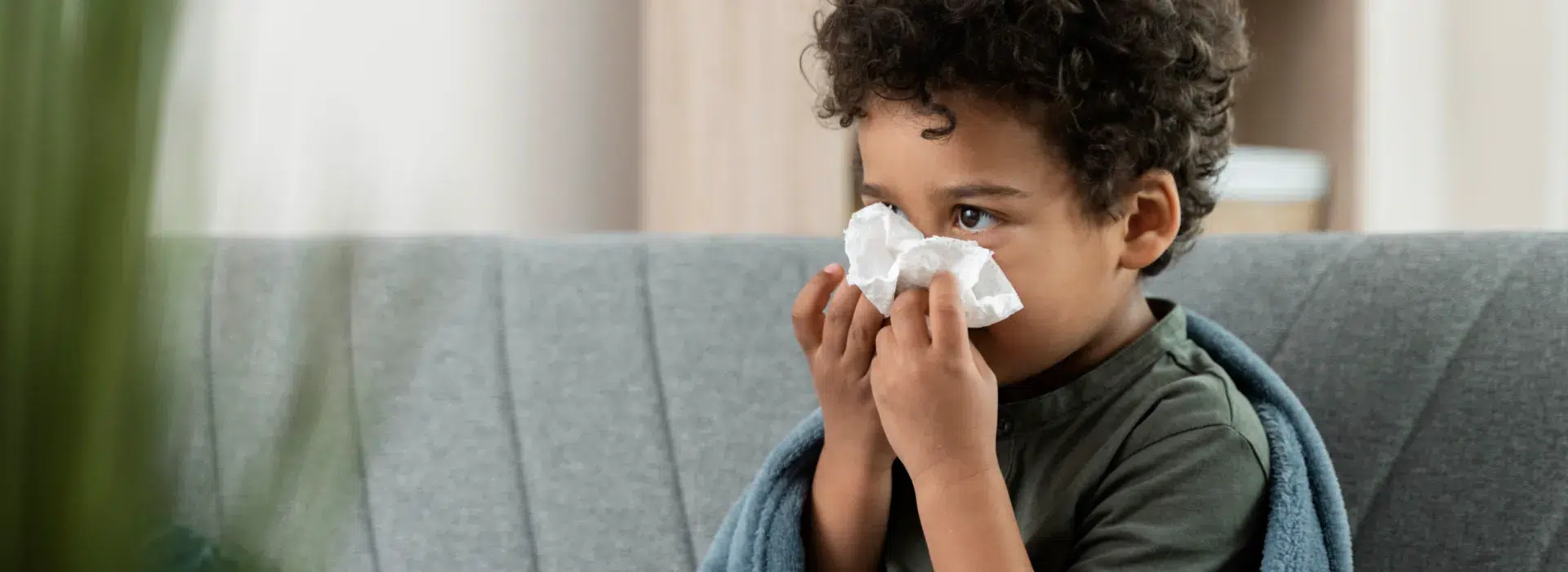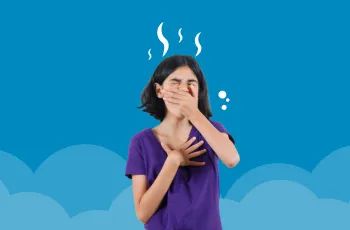How to Stop a Persistent (Constant) Cough in a Child?
Written by Priyanka Agarwal, Writer at Hola Health Medically reviewed by Dr Nelson Lau, MBBS FRACGP, GP & Digital Health Specialist

Contents

Dealing with a constant cough in a child can be distressing for both parents and the child. It disturbs sleep, appetite, and usually leads to unease and discomfort in the child. According to a survey by the National Library of Medicine, of 7670 children, 10% coughed more than other children, 69% coughed usually with a cold, 34% to 55% age-dependently coughed without colds, and 25% had night-time cough. Let’s explore how to stop a persistent cough in your child.
Causes of a persistent cough
A persistent cough can have various reasons, ranging from mild irritations to more significant underlying illnesses. Here are a few common reasons:- Respiratory infections: Respiratory infections, including the common cold, influenza (flu), bronchitis, and pneumonia, can induce a chronic cough.
- Allergies: Allergic responses to pollen, dust, mold, and other irritants can cause persistent coughing.
- Asthma: Asthma is a chronic disorder in which the airways become inflamed and restricted, resulting in coughing, wheezing, and trouble breathing.
- GORD (Gastroesophageal Reflux Disease): Stomach acid reflux into the esophagus can cause a persistent cough, which is generally worst at night.
- Postnasal Drip: Excess mucus from the nose or sinuses can irritate the throat and cause chronic coughing.
- Bronchitis: Chronic Bronchitis is a kind of COPD (Chronic Obstructive Pulmonary Disease) in which the airways become persistently irritated, resulting in a continuous cough with mucous.
- Environmental factors: Air pollution, chemicals, and smoking (including second-hand smoke) can all irritate the respiratory system.
- Lung diseases: Cystic fibrosis, and tuberculosis can all cause persistent coughing.
Home remedies for children
Coughs in children can cause anguish for both the child and the parent. Here are some effective home treatments for relieving coughs in children:- Hydration: Encourage your kid to drink plenty of fluids, such as water, herbal teas, and clear broths. This keeps their throat wet and decreases mucous.
- Honey: Honey can help soothe coughs in children over the age of one. Give them a spoonful of honey or combine it with warm herbal tea. Honey contains natural cough-suppressing qualities.
- Warm fluids: Warm beverages, such as warm water or herbal teas (without caffeine), help relieve a sore throat and coughing.
- Humidifier: Place a cool-mist humidifier in your child's bedroom, particularly at night. This keeps the air wet, which can reduce coughing and congestion.
- Steam inhalation: Just like in adults, steam inhalation can help remove mucus and alleviate coughing in children. Create a steam tent by running a hot shower and allowing your youngster to breathe in the steam.
- Elevate the head: Raising your child's head slightly while sleeping will help relieve nighttime coughing.
- Saltwater nasal drops: For children with coughing caused by nasal congestion, saltwater nasal drops can help thin mucus and cleanse nasal passages.
- Rest: Make sure your child gets enough sleep, since it helps the body recover from sickness and strengthens the immune system.
- Warm baths: Warm baths may be pleasant and relaxing for your kid, and they may also relieve coughing.
- Avoid irritants: Keep your kid away from smoke, strong odours, and other environmental irritants that may cause or intensify coughing.
- Proper nutrition: Provide your kid with nutritious meals that help their immune system, such as fruits, vegetables, and warm soups.
What to avoid?
When dealing with a child's cough, there are certain things you should avoid preserving their comfort and well-being:- Avoid smoking and second-hand smoke: Keep your child away from cigarette smoke, which can aggravate coughing and irritate the respiratory system.
- Cough suppressants and over-the-counter drugs: Young children should not be given over-the-counter cough suppressants or medications without first speaking with a healthcare practitioner. These medicines may be unsafe or ineffective for children of a particular age.
- Honey for children under one year: While honey can be a calming cure for coughs in older children, it should not be administered to infants under one year old owing to the danger of infant botulism.
- Caffeinated and sugary beverages: Avoid feeding caffeinated beverages (such as soda or caffeinated teas) and sugary drinks to youngsters, as they can dehydrate them and give little nutritional value.
- Chilly air exposure: While fresh air is beneficial, do not expose your kid to cold air, as it can irritate their airways and exacerbate coughing.
- Harsh chemicals and scents: Keep your youngster away from harsh cleaning chemicals, perfumes, and other strong odors that might irritate their fragile respiratory system.
- Excessive physical activity: Encourage your kid to relax and avoid strenuous physical activity, especially if they have a severe cough or other symptoms such as fever or exhaustion.
- Unnecessary antibiotics: Avoid compelling healthcare practitioners to give unnecessary antibiotics, as this adds to antibiotic resistance.
- Late bedtimes: Make sure your child gets enough sleep by sticking to a regular bedtime. Sleep deprivation can weaken the immune system and cause healing to take longer.
- Stress and anxiety: Reduce stress and anxiety in your kid, since emotional stress can exacerbate symptoms. Offer reassurance and support during their sickness.
When to consult a doctor?
If your child has a persistent cough that lasts more than a few days, it is important to consult a doctor. If the cough does not improve with home remedies and is accompanied by symptoms such as fever, fatigue, difficulty breathing, chest pain, or loss of appetite, it is advisable to seek medical advice promptly. Urgent medical care is also crucial for infants under 3 months old, children with comorbidities, or if you have significant concerns about their conditions. Connect with a registered doctor online within 15 minutes via telehealth appointment.Will an online doctor help with constant cough in children?
Yes, consulting an online doctor can be beneficial in managing constant cough in children. Online doctors can offer advice and assess symptoms through video consultations and recommend suitable treatments. However, if the child exhibits severe symptoms or needs physical examination, an in-person visit to the clinic may still be required. Remember to always consider the severity of the symptoms when deciding whether to consult an online doctor or seek in-person advice. Addressing a constant cough in a child involves a mix of supportive measures, environmental adjustments, and sometimes medical intervention. By identifying the root cause and implementing suitable remedies, parents can help reduce their child’s discomfort and promote a speedy recovery.Feeling sick and unsure why? Talk to a doctor online, available 24/7
Consult now
Available 24/7, across Australia.
Feeling sick and unsure why? Talk to a doctor online, available 24/7
Consult now
Available 24/7, across Australia.
Providing consult for
- Cough
- Nausea & vomiting
- Fever
- Hayfever
- Fatigue
- Sore throat
- Acne
- Gout
- Eczema
- Rosacea
- Sunburn
- UTI
- Erectile dysfunction
- Contraception
- Morning sickness
- Morning after pill
- Prostate health
- Anxiety
- Depression
- Stress
- Grief & loss
- Premature ejaculation
- Asthma
- Blood pressure
- Diabetes
- Cholesterol
- Migraines & headaches
- Allergies
- Heartburn & reflux
- Sleep disorder
- Gastro
Related Articles
Disclaimer
This blog is for general informational purposes only and does not indicate that Hola Health provides all treatments or preventive measures mentioned. It is not intended to be a substitute for professional medical advice. Always seek the guidance of your doctor or other qualified health professional with any questions you may have regarding your health or a medical condition. For emergencies please immediately contact 000. Any medical topics discussed are intended to educate, not to imply availability through Hola Health.




